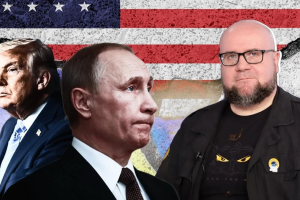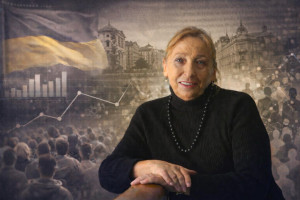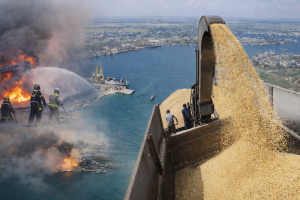Ukrainians' European Integration Aspirations: from Ambivalence to Expression
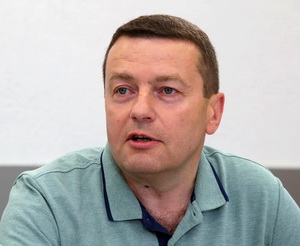
Oleksandr Reznik,Head of the Department of Social and Political Processes of Institute of Sociology NAS of Ukraine, Head of the Center for Political Sociology
The June 23, 2022 granting of European Union candidate status to Ukraine has legally consolidated on a pan-European level Ukrainian aspirations regarding the irreversibility of its civilized choice. An effective argument in the years-long negotiations to grant this status was the public support for this integration course as the only desirable one for the citizens of Ukraine. However, the path to direct EU accession depends on the extent to which European aspirations are widespread among all social groups in Ukrainian society and whether Ukrainians share European principles of organization of the social system and European values, in particular the democratic system.
Even when in the early 2000s the public sphere began to intensively discuss different ways of development of Ukraine, the people perceived these reference points mainly in abstract terms. Most Ukrainians were not interacting with Europeans because the difficult socio-economic situation and visa regime were not conducive to travel to Europe. Among part of the population there remained both sociocultural tendencies and pragmatic views on the advisability of deepening economic ties with Russia and the CIS countries. Only later, having been convinced that the European Union means visa-free regime, employment opportunities and other positive achievements, Ukrainians carried out a certain adjustment of their generalized geopolitical attitudes, caused by the need to involve them in an appealing social environment. Thanks to sociological surveys, we can see the dynamics of this correction and understand the reasons why Ukrainians were in a state of foreign policy uncertainty for a long time after the declaration of independence.
Sociologists use a number of empirical indicators in the measurement of Euro-integration orientations, which allow to assess the nature and direction of changes in public opinion regarding the idea of Ukraine's accession to the European Union. Among these indicators, the most commonly used are:
– emotional-evaluation indicators, which allow to express a general positive, negative or neutral attitude towards various geopolitical vectors of development, in particular, towards the idea of Ukraine's accession to the European Union;
– rational-evaluation indicators, which express people's opinion about European integration by comparing this geopolitical direction with others, which shows the respondent's preferences in the advisability of the country joining one of them;
– declarative-establishment indicators, reflecting the willingness of the respondent to vote at a possible expression of will, in particular, at the referendum on Ukraine's accession to the European Union.
It is because of this characteristic feature of each of the indicators one can often see differences in the percentage of support for European integration among the population of Ukraine in sociological surveys. This is especially noticeable when these surveys are conducted at the same time. When the respondent evaluates a particular geopolitical direction of possible development, he activates generalized political attitudes, which are often pragmatic and can still be contradictory, because the alternate evaluation of different civilizational vectors does not fully distinguish them. But by answering a question that contains several answer options, a person's value and ideological mindset is activated: the evaluation is made as a result of a rational comparison of different vectors of foreign policy development, taking into consideration one's own socio-cultural and ideological preferences.
While the imaginary situation of the referendum allows us to actualize the respondents' intentions regarding their behavior in the fateful act of expression of will. And if the evaluation of a certain foreign policy orientation or the advisability of the choice of the country's development path leaves people with a certain "backlash" of a distant perspective, the specific question about behavioural intentions already eliminates possible uncertainty and forces a clear answer. That is why the declarative indicator of European integration traditionally gives a slightly larger share of support or non-support.
In the monitoring study of the Institute of Sociology NAS of Ukraine since 2000, emotional-evaluation indicators, reflecting the attitude towards a certain integration course on a 3-point scale "1 – rather negative; 2 – hard to say; 3 – rather positive" are used. That is, different questions are asked for each geopolitical vector. If we compare the dynamics of the positive attitude of the population both to Ukraine's accession to the European Union and to the idea of Ukraine's accession to the alliance of Russia and Belarus, we can see significant swings during the 20 years of social transformation (Fig. 1).
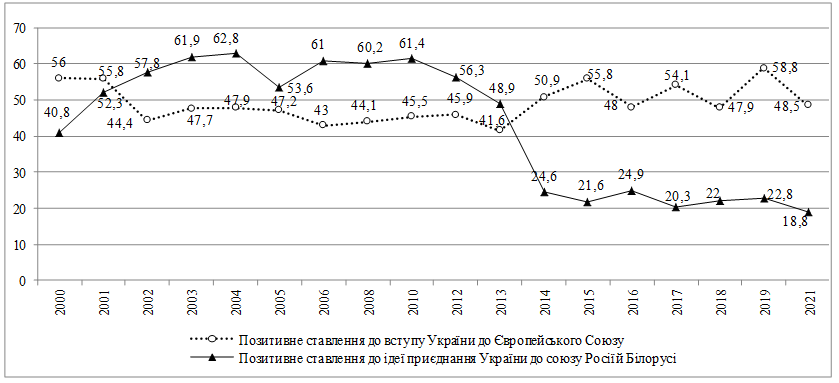
Fig. 1. Dynamics of positive responses of Ukrainian citizens to the question "What is your attitude towards Ukraine's accession to the European Union?" and "How do you feel about the idea of Ukraine joining the alliance of Russia and Belarus?", %
Source: Monitoring survey by the Institute of Sociology NAS of Ukraine
During the 2000s, support for the alliance of Russia and Belarus was expressed by about 60% of respondents; support for Ukraine's accession to the EU was prevalent among less than half of the population. Pro-European orientations at the time were significantly dominated by residents of the western and central part of the country, who were both ethnic Ukrainians and Ukrainian-speaking. In addition, support for an alliance with Russia (Eurasian orientation) was predominantly shared by residents of eastern and southern regions, ethnic Russians, and Russian-speaking citizens. The language issue (and the status of the Russian language in particular) was also a key factor in foreign policy orientations. Supporters of improving the status of the Russian language adhered to the Eurasian orientation, while opponents of this move were mainly in favor of European integration. The combination of these regional, ethno-linguistic splits with differently directed geopolitical vectors aggravated the disintegration of Ukrainian society.
After 2010, support for Ukraine's membership in the East Slavic Union began to decline and fell rapidly after Russia's aggression in 2014. At the same time, the positive attitude towards European integration after the events of 2014 increased by 10% and, although it varied over the years, reached about half of the adult population. Support for this civilizational choice peaked at 58.8% in 2019.
It is noteworthy that during the 2000s there was a phenomenon when a part of the population had a positive attitude to both geopolitical directions (Table 1).
Table 1
Dynamics of ambivalent attitude towards geopolitical ways of Ukraine's development (shares of positive attitude towards European and Eurasian integration of Ukraine at the same time), % of respondents
| 2000 | 2001 | 2002 | 2003 | 2004 | 2005 | 2006 | 2008 | 2010 | 2012 | 2013 | 2014 | 2015 | 2016 | 2017 | 2018 | 2019 | 2021 |
n | 343 | 480 | 386 | 476 | 507 | 340 | 367 | 341 | 412 | 371 | 202 | 45 | 86 | 81 | 84 | 91 | 118 | 63 |
% | 18.9 | 26.6 | 21.4 | 26.4 | 28.1 | 18.8 | 23.4 | 18.9 | 22.9 | 21.7 | 11.2 | 2.5 | 4.8 | 4.5 | 4.6 | 5.0 | 6.5 | 3.5 |
In Total | 1,810 | 1,800 | 1,799 | 1,800 | 1,800 | 1,800 | 1,800 | 1,801 | 1,800 | 1,800 | 1,800 | 1,800 | 1,802 | 1,802 | 1,800 | 1,800 | 1,802 | 1,800 |
Source: Monitoring survey by the Institute of Sociology NAS of Ukraine
The phenomenon of ambivalent mindset involved many issues of social development in a transitional society. However, this phenomenon was most evident regarding foreign policy orientations. In particular, the number of ambiguous supporters of both development paths reached more than a quarter of the adult population in the first half of the 2000s. A significant decrease in the number of citizens with ambivalent geopolitical orientations began even before the events of Euromaidan: in the summer of 2013, the survey recorded a decrease by half in the number of mixed opinions compared to previous years. Since 2014, the number of ambiguous opinions among Ukrainians has become low.
That is, throughout the 2000s there was a significant proportion of people in the minds of whom both geopolitical orientations were combined through a kind of ideological "reconciliation" of two different in essence and meaning civilizational directions within an unbalanced identity. This was a consequence of a defense reflex of the post-Soviet individual's consciousness, a difficult overcoming of the state of political marginality, which spread after the destruction of the usual political space and the formation of new reality of living in independent Ukraine. The simultaneous favoring of such people for both foreign policy vectors of the country's development was not evidence of their national-cultural priorities, but rather of their desire to live in a financially secure world, preferably bilingual, because these groups were favorably disposed toward giving Russian the status of an official language. This ambivalence explains the absurd slogan of some political forces at the time – "To Europe with Russia!", in other words, there was a reconciliation of "old" and "new", rather than a confrontation between them. At the time, this was a characteristic, though contradictory, sign of the existence of people on two institutional levels. This is connected with the phenomenon of "double institutionalization," as revealed by Yevhen Holovakha and Natalia Panina, when a transitional society simultaneously accepts the "old" social institutions, which have lost their legality but have remained legitimate, and the "new" social institutions, which have become legal and have remained non-legitimate. Existence in such an institutional space, when two systems of institutions operate simultaneously and come into conflict with each other, provided compensatory and stabilizing functions in an unbalanced transitional society [Holovakha, Panina, 2001]. Thus, dual institutionalization has produced contradictory “double identities.”
Such an "overlap" of civilizationally incompatible identities could not last long in the consciousness of the post-Soviet individual. It was the problem of the sliding down to authoritarianism under President Yanukovych that forced citizens to distinguish between the European and Eurasian path of development of Ukraine on the eve of the dramatic events of Euromaidan and especially after Russia's aggression in 2014. At the same time, among the active members of society there was a process of replacement of traditionally assigned ethno-cultural identities by a value-rational understanding of the advantages of democracy, which was represented by the possible European integration of Ukraine. Ukrainian society began to view European integration as an external factor of modernization and democratic transition. European structures were seen by Ukrainians as a kind of supervisor of corrupt political elites.
The dramatic events of civil activism in Ukraine in the winter of 2013-2014 were caused by the government's refusal to sign the Association Agreement with the EU. The Revolution of Dignity was the first revolutionary protest in the post-Soviet space, not directly related to elections, but to democratic aspirations. A comparison of the determinants of participation in protest actions in both Maidans is evidence of this. The common factors in both protests were microregional splits and public concerns about foreign policy priorities. However, in defining participation in the Orange Revolution, these factors were combined with factors of linguistic identification, age and status differentiation. In contrast, participation in the Revolution of Dignity was driven by support for democratic and market values. [Reznik, 2016]. A sense of external threat and the new hopes of citizens encouraged a national consensus on key political issues. Resistance to Russian aggression in 2014 caused a burst of civic national pride and a sense of national belonging; support for Ukraine's accession to the EU and NATO increased, while support for integration with Russia decreased. The geography of the expansion of Ukrainian identity spread everywhere in the Eastern and Southern regions, except in the Donbas, where significant pro-Russian orientations were observed even in Ukrainian-controlled territories. But in these territories, there has also been a change: the Eurasian orientation has decreased and the European orientation has increased. After 2014, pro-European orientations gradually became free of the influence of ethno-linguistic differentiation, as the influence of ethnic identity and native language began to decline sharply; a clear connection between the pro-European aspirations of Ukrainians and democratic values was recorded [Reznik, Reznik, 2017]. This indicates the genuineness of choosing Europe, and not just a pragmatic desire to enjoy the economic benefits of a more economically and socially successful political space.
In fact, back in the 2000s Iryna Bekeshkina, studying the problems of democratic transition in Ukraine, drew attention to the fact that the economic crisis of 2008 influenced the assessment of democracy as the most desirable type of state structure. Everything pointed to the fact that the worsening economic situation led to a decrease in support for the democratic system and an increase in indifference and support for authoritarianism. However, Bekeshkina found that there is a significant difference in the commitment to democracy between those who choose the European vector of Ukrainian integration and those who focus on Russia and Belarus. Democracy is primarily chosen by those who would prefer that Ukraine join the European community and not be in an alliance with Russia and Belarus. Moreover, the correlations between foreign policy orientations and the choice of the type of political regime were much closer than the correlations between the feeling of economic crisis and the choice of a certain type of political regime [Bekeshkina, 2009]. In fact, the results of a 2021 monitoring survey by the Institute of Sociology NAS of Ukraine show that this pattern is reproducible (Table 2.)
Table 2
Choice of the Ukrainian population's desired political system in accordance with their geopolitical orientations, % (2021)
People have different opinions about political life. Please mark which of the following statements you most agree with | Geopolitical orientations of Ukrainians | |
Those who are positive about Ukraine's accession to the European Union | Those who are positive about the idea of Ukraine joining the alliance of Russia and Belarus | |
Democracy is the best political system for any modern state | 68.9 | 28.7 |
For people like me, it doesn't matter if we have a democratic or non-democratic regime | 18.1 | 40.6 |
Under certain circumstances, an authoritarian "strong arm" type government would be better | 12.9 | 30.7 |
IN TOTAL | 100.0 | 100.0 |
In particular, among those who are positive about Ukraine's accession to the European Union, the vast majority agree with the statement that democracy is the best political system for a modern state. However, politically indifferent and prone to authoritarianism prevail among supporters of Ukraine's accession to the alliance of Russia and Belarus.
In sociological surveys of the Democratic Initiatives Foundation, a rational-estimation indicator of geopolitical orientations is used, which avoids ambivalent responses from respondents (Table. 3). The respondent has to choose between the proposed options, which allows us to know their true orientations, because here, in addition to the specified foreign policy directions, it is possible to choose the option of not joining any geopolitical alliance.
Table 3
Dynamics of answers of the Ukrainian citizens to the question "What integration direction should Ukraine take?", %
Answer options | August 2020 | November 2020 | February 2021 | August 2021 | February 2022 |
Accession to the European Union | 49.8 | 49.3 | 50.9 | 49.4 | 54.9 |
Accession to the Eurasian Economic Union (with Russia, Belarus, Kazakhstan) | 12.2 | 13.4 | 13.0 | 13.1 | 9.2 |
Not to join any union | 28.5 | 25.3 | 27.3 | 25.9 | 24.3 |
Hard to say | 9.5. | 12.1 | 8.8 | 11.7 | 11.7 |
IN TOTAL | 100.0 | 100.0 | 100.0 | 100.0 | 100.0 |
The survey was conducted by the Ilko Kucheriv Democratic Initiatives Foundation in cooperation with the Center for Political Sociology. In each case, 2,000 respondents were interviewed on a sample representing the adult population of Ukraine (excluding the occupied territories). The sample is representative of such indicators as gender, age, type of settlement, and oblast of residence. The maximum random sampling error does not exceed 2.2%.
So, in recent years, about half of the population was tended to choose the pro-European direction of integration of Ukraine. It was only on the eve of Russia's large-scale invasion of Ukraine that the number of supporters of European integration slightly increased. Characteristically, the socio-demographic differences in the choice of the European integration vector, although not critical, have remained noticeable up to now. European orientation grew with declining age, increasing levels of education and material status, belonging to the Western and Central regions, and the recognition of Ukrainian as a native language.
In contrast, support for the option that embodies the pro-Russian direction of the answer did not exceed 13% of responses. At the same time, consistently about a quarter of the population considered the policy of Ukraine's non-alignment with any union to be optimal. Actually, the position of non-alignment came from the former support for the Eurasian vector, but after the start of the war with Russia in 2014, this part of the population could no longer express themselves as supporters of integration with the aggressor country, so they had to define themselves outside the "pro-European direction – pro-Russian direction" dichotomy scale. It was both the Eurasian orientation and the orientation toward non-alignment that were caused by similar determinants: with increasing age, decreasing levels of education and material status, and belonging to such regions as the South, the East, and the Donbas.
Research by the Democratic Initiatives Foundation showed that in the eve of a full-scale Russian-Ukrainian war, people with different geopolitical orientations demonstrated an unequal degree of readiness to fight against a possible invasion (Table. 4).
Table 4
Readiness of Ukraine's population to resist possible Russian aggression in accordance with their geopolitical orientations, % (February 2022)
Russia is concentrating its armed forces on Ukraine's borders and demonstrating its readiness to launch a new invasion. If this happens, what would be your reaction? | What integration direction should Ukraine take? | |||
Accession to the European Union | Accession to the Eurasian Economic Union | Not to join any union | Hard to say | |
I will join the Armed Forces to repel aggression at the front | 10.9 | 1.6 | 5.9 | 5.2 |
I will join the volunteer forces to fight the aggressor at the front and rear of the enemy | 19.1 | 4.4 | 9.0 | 9.9 |
I will provide all possible non-military assistance (money, work, as a blood donor, etc.) | 31.8 | 8.2 | 21.8 | 14.2 |
I will not do anything, I will just try to survive | 14.8 | 22.5 | 21.8 | 18.9 |
I will try to leave the country | 2.7 | 2.2 | 4.0 | 3.9 |
I do not believe it will ever happen | 7.4 | 41.8 | 17.4 | 12.0 |
Hard to say | 13.3 | 19.2 | 20.3 | 36.1 |
IN TOTAL | 100.0 | 100.0 | 100.0 | 100.0 |
If conditionally we count the answers ""I will join the Armed Forces to repel aggression at the front", "I will join the volunteer forces to fight the aggressor at the front and rear of the enemy" and "I will provide all possible non-military assistance (money, work, as a blood donor, etc.)" as the ability to fight, there were 61.8% of respondents who volunteered for resistance among those who support Euro-integration. It was expected that among the supporters of Eurasian integration the share of those inclined to active resistance reached only 14.2% of respondents. While 36.7% of the supporters of non-alignment to any of the integration unions were registered.
As a result of the unseen migration shifts caused by a full-scale war, the Democratic Initiatives Foundation, together with the Center for Political Sociology, was able to conduct a representative face-to-face survey in May 2022 in only two regions (Western and Central). Consequently, a correct comparison of geopolitical orientations with the February, "pre-war" survey could only be made for these regions (Table. 5). Accordingly, the survey recorded a striking increase, especially in the Central region (+31%), support for the course towards European integration and a corresponding decrease in the shares of other response options.
Table 5
Dynamics of answers of the Ukrainian citizens to the question "What integration direction should Ukraine take?", %
| February 2022 | May 2022 | |||||
Answer options | West | Center | South | East | Donbas | West | Center |
Accession to the European Union | 79.4 | 55.7 | 44.2 | 38.8 | 25.6 | 90.8 | 86.8 |
Accession to the Eurasian Economic Union (with Russia, Belarus, Kazakhstan) | 0.0 | 7.8 | 11.0 | 17.9 | 25.6 | 0.0 | 0.0 |
Not to join any union | 10.3 | 25.5 | 32.5 | 25.4 | 45.0 | 3.7 | 6.5 |
Hard to say | 10.3 | 11.0 | 12.3 | 17.9 | 3.9 | 5.4 | 6.7 |
IN TOTAL | 100.0 | 100.0 | 100.0 | 100.0 | 100.0 | 100.0 | 100.0 |
Actually, the Russian-Ukrainian war of 2022, the consequences of which directly affected almost every citizen, destroyed any illusions or uncertainties about friends and enemies, Ukraine's own capabilities to resist aggression, and the future of their families. This turning point occurred not only because of an awareness of the danger of occupation, but also because of the realization that even the sometimes pointless and imperfect but still liberties and freedoms inherent in public life in Ukraine could be instantly destroyed. This was also achieved due to the overwhelming support and solidarity of the European countries, which have hosted millions of Ukrainian refugees and financially help them to survive in the conditions of the destroyed economy.
Finally, the declarative indicator of the attitude of Ukrainians toward European integration, which is used in telephone surveys using the computer of the sociological group "Rating", allows us to demonstrate slightly higher percentages of support (Table 6).
Table 6
Dynamics of answers of the Ukrainian citizens to the question "If a referendum on Ukraine's accession to the European Union were held today, how would you vote?", %
Answer options | 01'22 | 16–17.02'22 | 01.03'2022 | 30–31.03'2022 | 18–19.06'2022 |
For accession | 65 | 68 | 86 | 91 | 87 |
I refuse to vote | 2 | 2 | 5 | 4 | 8 |
Hard to say | 6 | 6 | 4 | 1 | 1 |
Against | 28 | 24 | 5 | 4 | 4 |
IN TOTAL | 100 | 100 | 100 | 100 | 100 |
Source: [Sociological group "Rating", 2022].
The results of "Rating" polls show that in early 2022, even before a full-scale war, about a quarter of the population claimed that in a referendum they would vote against Ukraine joining the European Union, while two-thirds would vote for accession. However, the aggression of the eastern neighbor forced to reduce the number of opponents to a minimum.
A similar declarative indicator is used by Kyiv International Institute of Sociology (KIIS). The survey of 2000 respondents, which was conducted from July 6-20, 2022 using computer-assisted telephone interviews, showed a significant increase compared with 2021 in the support of Ukrainians for the course towards European integration [Hrushetsky, 2022]. It was found that if there were a referendum on EU accession among all respondents, 81% would vote for accession; 4% would vote against accession. Others (15%) would not vote or do not know how to vote. But in 2021, the number of those who intended to vote for Ukraine's accession to the EU reached 52%.
The results of the KIIS survey show impressive changes in the growth of support regionally. As expected, support is highest among residents in the West (2021 – 70%; 2022 – 88%) and the Centre (2021 – 58%; 2022 – 81%). However, incredibly rapid growth occurred in the South (2021 – 39%; 2022 – 77%) and the East (2021 – 29%; 2022 – 71%). Although there are certain differences by linguistic and ethnic categories of the population of Ukraine (Ukrainians – 85%, Ukrainians-bilinguals – 79%, Russian-speaking Ukrainians – 76%, Russian-speaking Russians – 53%), yet, for the first time in years of surveys, support for accession to the EU significantly prevails in all these groups.
Conclusions
Under the threat to the existence of the Ukrainian nation as a result of large-scale aggression by its northern neighbor, old post-Soviet institutions and corresponding identities began to rapidly lose their social legitimacy. Russia's invasion of Ukraine on February 24, 2022, maximized support for European integration and caused the vast majority of Ukrainians to no longer critically differentiate by region and language. In addition, pro-European orientations were the key to sustainability and the ability to fight Russian invaders.
The case of Ukraine shows that successful democratic transition of Eastern European countries needs a geopolitical goal that includes support for a democratic order. The fact that the majority of supporters of European integration support democratic values is important for the post-war society. The clear connection between the European aspirations of Ukrainians and democratic values demonstrates the sincerity of the European choice. In fact, after the end of the Russian-Ukrainian war, it is the Ukrainians' European aspirations that will securely block any temptation of a slide toward authoritarianism.
Sources:
Bekeshkina, I. (2009). An Examination for Democracy. V. Vorona, M.Shulga (ed. ) Ukrainian Society 1992–2009. Dynamics of social change (pp. 348–357). Kyiv: Institute of Sociology NAS of Ukraine.
Holovakha, Y., Panina, N. (2001). Post-Soviet Deinstitutionalization and the Creation of New Social Institutions in Ukrainian Society. Sociology: theory, methods, marketing, 4, 5–22.
Hrushetsky, A. (2022). Geopolitical orientations of Ukrainian residents: results of a telephone survey conducted on July 6-20, 2022. KIIS website. URL: https://www.kiis.com.ua/?lang=ukr&cat=reports&id=1125&page=1
Sociological group "Rating". Thirteenth National Poll: Foreign Policy Orientations (June 18-19, 2022). URL: https://ratinggroup.ua/research/ukraine/trinadcatyy_obschenacionalnyy_opros_vneshnepoliticheskie_orientacii_18-19_iyunya_2022.html
Reznik O., Reznik V. (2017). Ukraine's European Choice as a Social Condition of Democratic Transition, Ideology and Politics Journal, 2 (8), 117–145.
Reznik, O. (2016). From the Orange Revolution to the Revolution of Dignity: Dynamics of the Protest Actions in Ukraine. East European Politics and Societies, 30 (4), 750–765.





